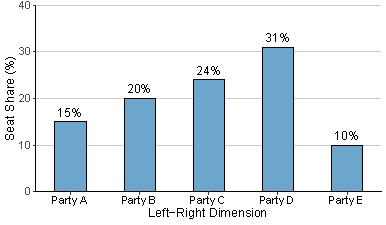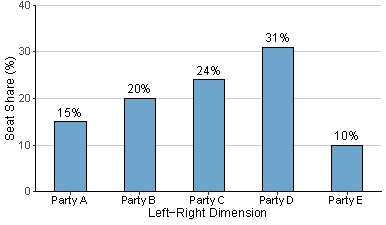Deck 10: Political Systems and Government Formation
Question
Question
Question
Question
Question
Question
Question
Question
Question
Question

Unlock Deck
Sign up to unlock the cards in this deck!
Unlock Deck
Unlock Deck
1/10
Play
Full screen (f)
Deck 10: Political Systems and Government Formation
1
Which of these statements about a semi-presidential system is FALSE?
A) The government, headed by a prime minister, depends on an (at least implicit) parliamentary majority.
B) There exists a directly elected president with an electoral mandate.
C) Voters vote in two separate elections, one for parliament and one for the president.
D) The president is always more powerful than the prime minister.
A) The government, headed by a prime minister, depends on an (at least implicit) parliamentary majority.
B) There exists a directly elected president with an electoral mandate.
C) Voters vote in two separate elections, one for parliament and one for the president.
D) The president is always more powerful than the prime minister.
D
2
What of the following correctly describes the process for electing the EU Commission president?
A) The Commission president is elected by the European Council by qualified majority.
B) The Commission president is proposed by the European Parliament and elected by the European Council by qualified majority.
C) The Commission president is proposed by the European Council by qualified majority and elected by the European Parliament.
D) The Commission president is proposed by the Council of the European Union by unanimity and elected by the Council of Europe.
A) The Commission president is elected by the European Council by qualified majority.
B) The Commission president is proposed by the European Parliament and elected by the European Council by qualified majority.
C) The Commission president is proposed by the European Council by qualified majority and elected by the European Parliament.
D) The Commission president is proposed by the Council of the European Union by unanimity and elected by the Council of Europe.
C
3
Which of these statements regarding the system of government in the EU is correct?
A) The EU has both features of parliamentary and presidential systems.
B) The EU has neither features of a parliamentary nor a presidential system.
C) The EU is best described as a parliamentary system.
D) The EU is best described as a presidential system.
A) The EU has both features of parliamentary and presidential systems.
B) The EU has neither features of a parliamentary nor a presidential system.
C) The EU is best described as a parliamentary system.
D) The EU is best described as a presidential system.
A
4
Consider the following election outcome:
 Which majority coalition would you expect to form if the parties were purely office-seeking?
Which majority coalition would you expect to form if the parties were purely office-seeking?
A) Party C and Party D
B) Party B and Party D
C) Party A and Party D
D) Party A, Party B and Party C
 Which majority coalition would you expect to form if the parties were purely office-seeking?
Which majority coalition would you expect to form if the parties were purely office-seeking?A) Party C and Party D
B) Party B and Party D
C) Party A and Party D
D) Party A, Party B and Party C

Unlock Deck
Unlock for access to all 10 flashcards in this deck.
Unlock Deck
k this deck
5
Consider the following election outcome:
 Which coalition would you expect to form if the parties were purely policy-seeking?
Which coalition would you expect to form if the parties were purely policy-seeking?
A) Party C and Party D
B) Party B and Party D
C) Party A and Party D
D) Party A, Party B and Party C
 Which coalition would you expect to form if the parties were purely policy-seeking?
Which coalition would you expect to form if the parties were purely policy-seeking?A) Party C and Party D
B) Party B and Party D
C) Party A and Party D
D) Party A, Party B and Party C

Unlock Deck
Unlock for access to all 10 flashcards in this deck.
Unlock Deck
k this deck
6
The 2011 parliamentary election in Poland produced the following results:
 Suppose you are the leader of the largest party and try to form a government. If you live in a purely policy-seeking world, which majority-winning coalition would you strive to form?
Suppose you are the leader of the largest party and try to form a government. If you live in a purely policy-seeking world, which majority-winning coalition would you strive to form?
A) PO - PiS
B) PO - RP
C) PO - PSL
D) PO - SLD
 Suppose you are the leader of the largest party and try to form a government. If you live in a purely policy-seeking world, which majority-winning coalition would you strive to form?
Suppose you are the leader of the largest party and try to form a government. If you live in a purely policy-seeking world, which majority-winning coalition would you strive to form?A) PO - PiS
B) PO - RP
C) PO - PSL
D) PO - SLD

Unlock Deck
Unlock for access to all 10 flashcards in this deck.
Unlock Deck
k this deck
7
The 2011 parliamentary election in Poland produced the following results:
 Which of the following statements about the electoral results is FALSE?
Which of the following statements about the electoral results is FALSE?
A) The PSL is the median party in the legislature
B) PO is a veto player in the legislature on any issue
C) In a purely policy-seeking world, there would not be a coalition without PO
D) In a purely office-seeking world, we should observe the coalition PO-SLD
 Which of the following statements about the electoral results is FALSE?
Which of the following statements about the electoral results is FALSE?A) The PSL is the median party in the legislature
B) PO is a veto player in the legislature on any issue
C) In a purely policy-seeking world, there would not be a coalition without PO
D) In a purely office-seeking world, we should observe the coalition PO-SLD

Unlock Deck
Unlock for access to all 10 flashcards in this deck.
Unlock Deck
k this deck
8
Which of the following is not a trait of parliamentary democracy?
A) The election cycle can (to some degree) be determined politically.
B) The Prime Minister can ask for a vote of confidence
C) The parliament cannot remove the prime minister from office before the next scheduled election.
D) Government change may occur without an election.
A) The election cycle can (to some degree) be determined politically.
B) The Prime Minister can ask for a vote of confidence
C) The parliament cannot remove the prime minister from office before the next scheduled election.
D) Government change may occur without an election.

Unlock Deck
Unlock for access to all 10 flashcards in this deck.
Unlock Deck
k this deck
9
Which of the following statements about the vote of confidence is FALSE?
A) Prime Ministers can use a vote of confidence strategically to secure passage of a bill that might not otherwise pass.
B) The vote of confidence is only used sparingly, as it is a politically costly and potentially risky tool.
C) If the Prime Minister calls and loses a vote of confidence, the government must resign.
D) The parliament must ask that a vote of confidence be attached to a particular bill.
A) Prime Ministers can use a vote of confidence strategically to secure passage of a bill that might not otherwise pass.
B) The vote of confidence is only used sparingly, as it is a politically costly and potentially risky tool.
C) If the Prime Minister calls and loses a vote of confidence, the government must resign.
D) The parliament must ask that a vote of confidence be attached to a particular bill.

Unlock Deck
Unlock for access to all 10 flashcards in this deck.
Unlock Deck
k this deck
10
Which of the following types of government has been the common in post-WWII Europe?
A) Single-party majority government.
B) Minimal winning coalitions.
C) Single-party minority government.
D) Oversized (surplus majority) coalitions.
A) Single-party majority government.
B) Minimal winning coalitions.
C) Single-party minority government.
D) Oversized (surplus majority) coalitions.

Unlock Deck
Unlock for access to all 10 flashcards in this deck.
Unlock Deck
k this deck


